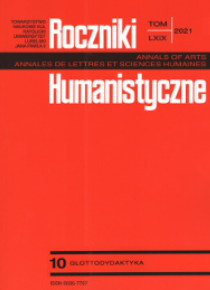SPECYFIKA NAUCZANIA LEKSYKI JĘZYKA OBCEGO W PRZYPADKU UCZNIÓW Z MYŚLENIEM O CHARAKTERZE KLIPOWYM
THE SPECIFICITY OF TEACHING FOREIGN LANGUAGE VOCABULARY IN THE CASE OF STUDENTS WITH ‘CLIP THINKING’
Author(s): Joanna KoziełSubject(s): Foreign languages learning, Language acquisition, Cognitive linguistics, Social Informatics, Pedagogy
Published by: Towarzystwo Naukowe KUL & Katolicki Uniwersytet Lubelski Jana Pawła II
Keywords: mosaic thinking; clip thinking; information society; cognitive style; glottodidactics;
Summary/Abstract: The aim of this article is to analyse the specificity of clip thinking as a phenomenon of our information society. The term “clip thinking” shows the changes that have taken place in the minds of “digital natives”. On the one hand, students who clip think have a tendency to generalise information and develop “hypertext minds”. On the other hand, clip thinking can have some positive aspects. This article is an attempt to find didactic methods which can develop the advantages of this phenomenon, and, at the same time, increase the effectiveness of lessons teaching Russian as a foreign language. The author demonstrates how to use the cognitive approach as a means of handling this problem in the educational process. The analysis indicates that special attention should be paid to holistic teaching and developing critical thinking and problem-solving skills. Finally, the author presents different types of exercises which are useful in teaching such digital natives.
Journal: Roczniki Humanistyczne
- Issue Year: 69/2021
- Issue No: 10
- Page Range: 109-120
- Page Count: 12
- Language: Polish

